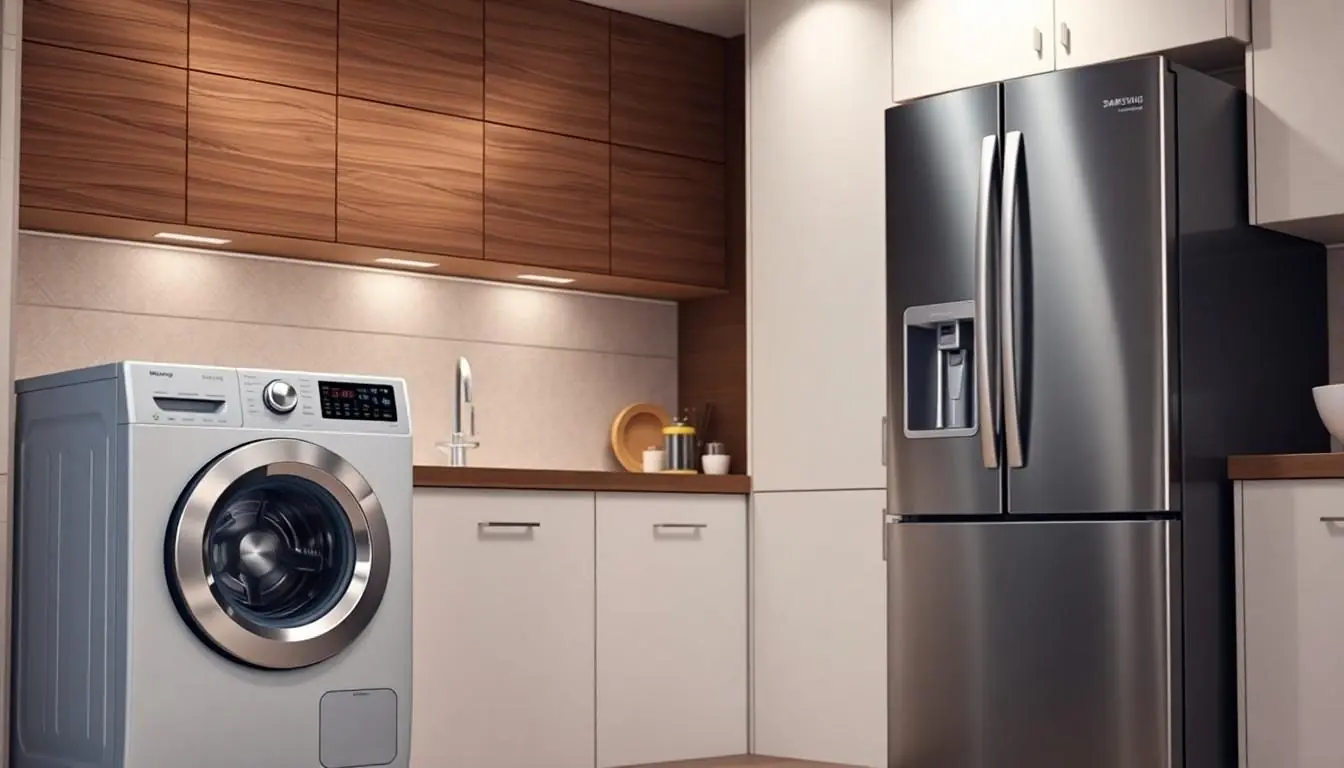In a world where the right home appliance can transform daily chores into a breeze, it’s no wonder that home appliance companies are the unsung heroes of modern living. From washing machines that practically fold laundry to refrigerators that keep your leftovers fresher than a morning breeze, these companies have mastered the art of convenience.
Table of Contents
ToggleOverview of Home Appliance Companies
Home appliance companies play a crucial role in modern households. These companies design, manufacture, and market appliances that streamline daily tasks. Leading brands include Whirlpool, Samsung, and LG, each offering innovative appliances that enhance convenience.
Whirlpool specializes in laundry and kitchen technologies, delivering efficiency and performance across its product range. Samsung combines cutting-edge technology and modern design, providing smart appliances that connect seamlessly to home networks. LG focuses on energy efficiency, offering refrigerators and washing machines that significantly reduce power consumption.
Each brand presents unique offerings, targeting various consumer needs. Kitchen appliances often feature advanced capabilities, like smart cooking modes and temperature controls. Laundry appliances include models with steam cleaning and allergen-reducing features.
Market trends reflect a growing demand for eco-friendly options. Companies innovate by utilizing sustainable materials and energy-efficient motors. As customers become more environmentally conscious, brands adapt product lines accordingly.
Moreover, consumer preferences for design aesthetics remain strong. Many families seek appliances that complement kitchen decor while maximizing functionality. Innovations in color choices and finishes cater to these design aspirations.
Growth in online shopping influences how consumers interact with home appliance companies. E-commerce platforms offer convenience and extensive product selections. Customers can compare prices, read reviews, and make informed purchasing decisions from home.
Overall, the competitive landscape among home appliance companies drives continuous advancements. These companies not only enhance everyday living but also prioritize sustainability and design, features vital for today’s consumers.
Leading Home Appliance Companies

Home appliance companies play a crucial role in modern households. Several top brands stand out due to their innovations and market presence.
Company Profiles
Whirlpool leads with a strong focus on laundry and kitchen technology, offering reliable products designed for efficiency. Samsung captivates consumers by blending cutting-edge smart technology with stylish designs, creating appliances that elevate everyday tasks. LG stands out for its commitment to energy efficiency, ensuring appliances operate sustainably while enhancing functionality. Other notable companies include GE Appliances, known for innovative designs, and Bosch, which focuses on high-performance, silent operation, meeting diverse consumer preferences.
Market Share and Influence
Whirlpool commands a significant portion of the market share, consistently ranking among the top companies in the industry. Samsung follows closely, leveraging its electronics expertise to enhance appliance technology. LG’s emphasis on sustainability attracts environmentally conscious consumers, expanding its market influence. Industry reports indicate that these leading brands collectively control over 50% of the global home appliance market. Additionally, innovations from these companies set trends, driving competition and encouraging advancements in energy efficiency and smart technology.
Innovations in Home Appliances
Home appliance companies consistently push boundaries to enhance everyday convenience and efficiency. Significant innovations shape the industry, focusing on smart technology and energy efficiency.
Smart Home Technology
Smart home technology revolutionizes user interaction with appliances. Many brands, including Samsung and LG, integrate Wi-Fi connectivity, allowing users to control devices remotely through smartphones. Features like voice commands simplify operations, making it easier to manage home environments effortlessly. For example, smart ovens can suggest recipes based on available ingredients. Additionally, appliances that learn user habits optimize energy consumption and performance. Data shows that nearly 70% of consumers prefer appliances equipped with smart technology, highlighting a shift toward digitally connected living spaces.
Energy Efficiency Trends
Energy efficiency trends emerge as key drivers in appliance innovations. Companies increasingly focus on developing eco-friendly appliances that minimize environmental impact. For instance, LG emphasizes energy-saving features across its product lines. The push for sustainability leads to the use of energy-efficient motors and recyclable materials. Research indicates that approximately 60% of consumers prioritize energy ratings when selecting appliances. Smart thermostats and energy monitoring apps help homeowners track usage, further promoting energy conservation. These advancements cater to environmentally conscious consumers while reducing utility costs.
Consumer Preferences and Trends
Consumer preferences are shaping the home appliance industry significantly. Many buyers prioritize energy efficiency and eco-friendliness in their purchasing decisions. Research indicates 60% of consumers consider energy ratings essential when selecting appliances. Consumers increasingly embrace online shopping, enhancing their ability to compare prices and gather product information. Direct feedback through ratings and reviews influences perceptions and choices. Engaging with smart technology appeals to nearly 70% of buyers, who seek appliances that facilitate convenience in their routines.
Buying Behaviors
Shopping for home appliances has evolved. Consumers now favor brands that emphasize sustainability and modern design alongside functionality. First-time buyers often research thoroughly, relying on online reviews and comparison tools. They appreciate user-friendly interfaces that maximize convenience, especially when integrating smart technology. Repeat buyers, however, tend to stay loyal to brands with proven reliability and innovative features. Discounts and promotions also impact buying behaviors, encouraging immediate purchases. These factors drive consumers to prioritize brands that align with their values and needs.
Popular Appliance Types
Demand for specific appliance types varies across households. Refrigerators, for example, hold popularity due to their essential role in food preservation. Many families opt for models featuring smart technology and energy-saving capabilities. Washing machines also continue to be a mainstay, particularly those with advanced settings that optimize washing efficiency. Dishwashers attract consumers seeking convenience and time savings. Other popular types include air conditioners and smart thermostats, highlighting the ongoing trend toward energy efficiency and automation. Overall, this demand drives brands to innovate and enhance functionality across all categories.
Challenges Faced by Home Appliance Companies
Home appliance companies encounter several challenges that impact their operations and market performance. Among these, supply chain issues and intense competition significantly influence their ability to innovate and deliver products to consumers.
Supply Chain Issues
Supply chain disruptions often lead to delays in product availability for home appliance companies. Increased shipping costs and fluctuating raw material prices aggravate the situation, affecting profitability. According to industry reports, 70% of companies have faced challenges due to supply chain constraints, resulting in longer lead times and stock shortages. Companies like Whirlpool and Samsung invest in optimizing logistics to mitigate these issues, establishing relationships with local suppliers for quicker access to materials. Ensuring a resilient supply chain remains essential for meeting consumer demands while maintaining market competitiveness.
Competition and Market Saturation
Intense competition characterizes the home appliance market, resulting in saturation across product categories. Companies grapple with the need to differentiate their offerings amidst a crowded landscape. Market research indicates that leading brands collectively control over 50% of the global market share, pushing even established players to innovate continuously. Customers frequently prioritize energy-efficient products, prompting brands like LG and Bosch to enhance eco-friendly features in their appliances. As consumer preferences shift towards smart technology, companies focusing on integrating connectivity face pressure to adapt quickly. Remaining relevant in this fast-evolving market requires ongoing investment in research and development.
Home appliance companies are at the forefront of transforming daily living. Their commitment to innovation and sustainability ensures that consumers enjoy convenience without compromising the environment. As brands like Whirlpool, Samsung, and LG continue to lead the market, they set the standard for energy efficiency and smart technology integration.
The shift toward eco-friendly options and stylish designs reflects changing consumer preferences. With the rise of online shopping, buyers can easily access information and make informed decisions. As competition intensifies, these companies will likely keep pushing the boundaries of what’s possible, creating appliances that enhance functionality while meeting the demands of modern households. The future of home appliances promises to be exciting, with advancements that will further simplify life and promote sustainability.


